[Dec 2007, Volume 4 Quarterly Issue] Pdf File size - The IIPM Think ...
[Dec 2007, Volume 4 Quarterly Issue] Pdf File size - The IIPM Think ...
[Dec 2007, Volume 4 Quarterly Issue] Pdf File size - The IIPM Think ...
Create successful ePaper yourself
Turn your PDF publications into a flip-book with our unique Google optimized e-Paper software.
REIMAGINING INDIA<br />
solution, or do they further endanger<br />
the chances of survival of the poor?<br />
Can democratic governments be allowed<br />
to forego their duties towards a<br />
majority of their trustees who vote<br />
them into power?<br />
Of late, various governments in India<br />
have been offering unprecedented<br />
incentives to the private sector with an<br />
eye on macro-economic growth. For<br />
instance, policies relating to establishment<br />
of Special Economic Zones<br />
(SEZs) include significant supports to<br />
private entrepreneurs in the form of<br />
facilitation of land acquisition, tax rebates<br />
and friendlier administrative<br />
mechanisms, amongst others. However,<br />
many of the provisions jeopardize<br />
the long-term interests of the poor in<br />
many ways and the much-touted objective<br />
of inclusive growth hasn’t come<br />
into effect. For instance, one of the<br />
largest Special Economic Zones in India<br />
proposed to be set up by Reliance<br />
Industries Limited in Maharashtra<br />
across three tehsils of Raigad district<br />
threatens to displace nearly 35,000<br />
farmers based over 25,000 hectares of<br />
agricultural land. <strong>The</strong> threat to the<br />
livelihoods of the farmers likely to lose<br />
ownership of land are sought to be offset<br />
merely by providing monetary compensation<br />
without any thoughts about<br />
the limited livelihood-choices available<br />
to them, consequent pressure on<br />
limited urban infrastructure, or the<br />
implications for a large number of nonowner<br />
dependents of farmland, e.g.<br />
sharecroppers or wage labourers.<br />
In similar developments across the<br />
country, as many as 396 SEZs have<br />
been accorded formal clearance by the<br />
government (by October <strong>2007</strong>), of<br />
which 149 have already been notified.<br />
When households displaced by SEZs<br />
or big projects migrate to cities, their<br />
survival becomes even more arduous,<br />
thanks to modern urban policies that<br />
increasingly shut out spaces from the<br />
reach of the poor. <strong>The</strong> commonest<br />
Markets, unless regulated with a pro-poor orientation, can<br />
eliminate the poor rather than contributing to poverty<br />
reduction, given the inherent tendencies of supply-side<br />
domination and profi t maximization<br />
coping avenues for the poor, e.g. participation<br />
in retail trade, accessing<br />
state-run basic services, or opting for<br />
low-investment livelihoods (e.g. rag<br />
picking or plying rickshaws) are made<br />
increasingly inaccessible by policies<br />
that allow entry of big business houses<br />
in retail trade, enhance the cost<br />
of basic services by allowing their<br />
privatization, or block public spaces<br />
for the poor.<br />
Another area of concern relates to<br />
increasing privatization of common<br />
property resources in the country,<br />
bearing life-threatening implications<br />
for a large number of poor communities.<br />
<strong>The</strong> operations of mining companies<br />
in various forest-rich areas of<br />
states like Chhattisgarh and Jharkhand<br />
have destroyed the age-old forestbased<br />
livelihoods of many tribal families.<br />
In Orissa, the state government<br />
has already committed several rivers<br />
and reservoirs for use by industry for<br />
water-intensive activities. In Chhattisgarh<br />
too, industries have been permitted<br />
to draw water from rivers like Kelo<br />
and Sheonath. Kelo, a tributary of Mahanadi<br />
river, happens to be an important<br />
source of livelihood for over sixty<br />
village communities settled alongside<br />
its 98 kilometer long stretch across<br />
Raigarh district of Chhattisgarh,<br />
whose lives have been badly affected<br />
due to severe decline in the stock of<br />
river water. During a People’s Tribunal<br />
held in Kolkata in January <strong>2007</strong>, Santwana<br />
Dey – an elderly woman hailing<br />
from a farmer household based in Bejiberia<br />
village of Singur where the<br />
Government of West Bengal acquired<br />
land for handing over to Tata Motors<br />
in lieu of promises of jobs in a car factory<br />
and offers of monetary compensation,<br />
raised a fundamental issue: ‘no<br />
one can dictate what should my family<br />
do for a living; we have a right to pursue<br />
occupations that we are capable of and<br />
cannot be forced to work in a car factory,<br />
which we have no inkling about!’<br />
Santwana’s straightforward assertion<br />
in the Tribunal underscored a legiti-<br />
72 THE <strong>IIPM</strong> THINK TANK


![[Dec 2007, Volume 4 Quarterly Issue] Pdf File size - The IIPM Think ...](https://img.yumpu.com/29766298/71/500x640/dec-2007-volume-4-quarterly-issue-pdf-file-size-the-iipm-think-.jpg)
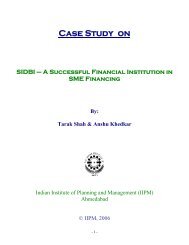
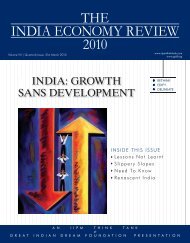
![[Feb 2008, Volume V Annual Issue] Pdf File size - The IIPM Think Tank](https://img.yumpu.com/43961117/1/190x245/feb-2008-volume-v-annual-issue-pdf-file-size-the-iipm-think-tank.jpg?quality=85)
![[June 2008, Volume V Quarterly Issue] Pdf File size - The IIPM Think ...](https://img.yumpu.com/41693247/1/190x245/june-2008-volume-v-quarterly-issue-pdf-file-size-the-iipm-think-.jpg?quality=85)
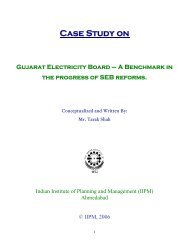
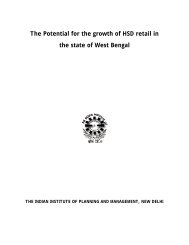
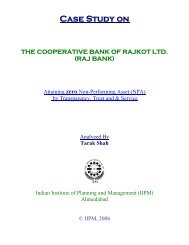

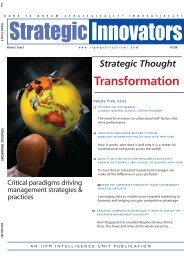
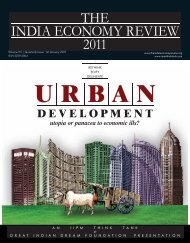
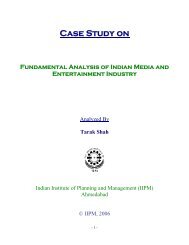
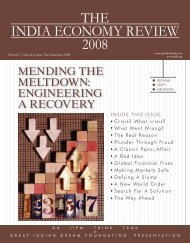
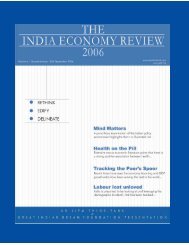
![[Volume VI | Quarterly Issue: 31st May 2009] Pdf File size](https://img.yumpu.com/27796051/1/190x245/volume-vi-quarterly-issue-31st-may-2009-pdf-file-size.jpg?quality=85)